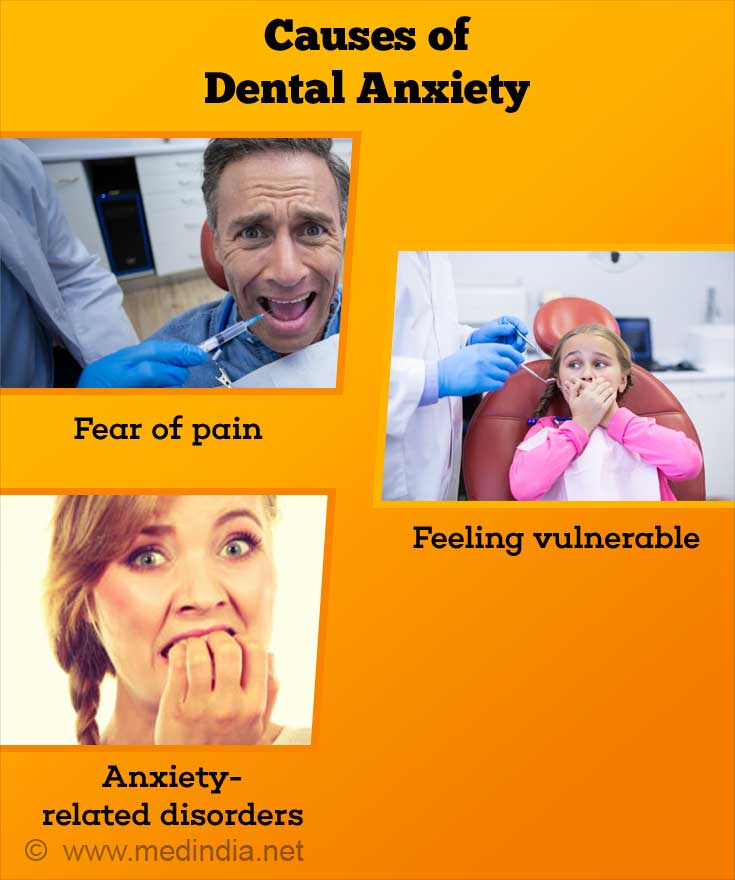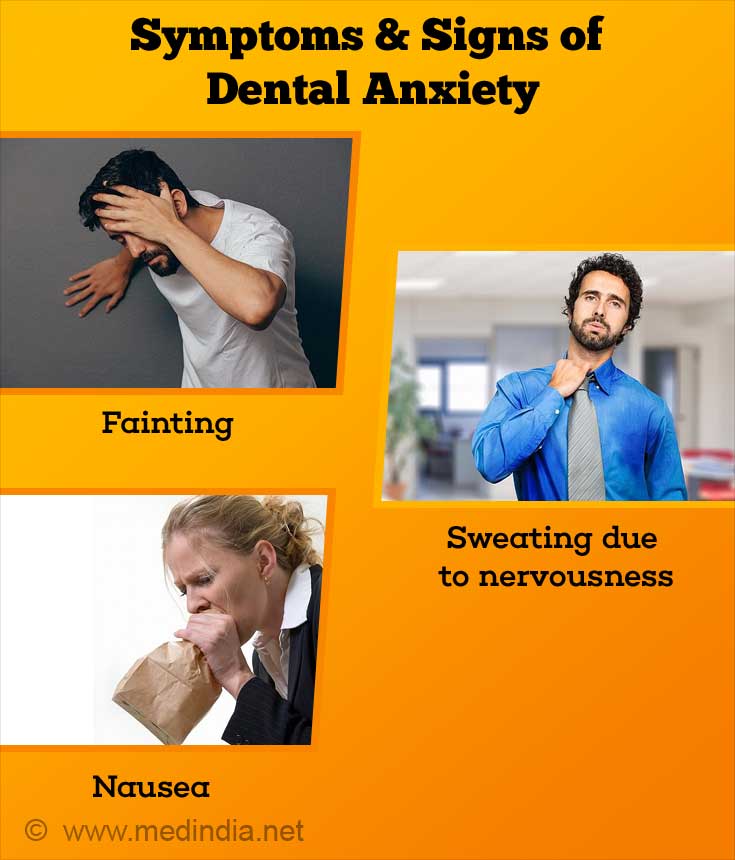- The Effects Of Dental Anxiety And Irregular Attendance On Referral For Dental Treatment Under Sedation Within The National Health Service In London 17 By Peter Milgrom, J. T. Newton, Carole Boyle, Lisa J. Heaton, and Nora Donaldson. - (https://www.ncbi.nlm.nih.gov/pmc/articles/PMC2945617/)
- Oral Sedation: A Primer on Anxiolysis for the Adult Patient By Mark Donaldson, Gino Gizzarelli, and Brian Chanpong - (https://www.ncbi.nlm.nih.gov/pmc/articles/PMC1993866/)
- The contribution of embarrassment to phobic Dental Anxiety: a qualitative research study By Rod Moore, Inger Brødsgaard and Nicole Rosenberg. - (https://www.ncbi.nlm.nih.gov/pmc/articles/PMC411042/)
- Strategies to manage patients with Dental Anxiety and dental phobia: literature review By Deva Priya Appukuttan. - (https://www.ncbi.nlm.nih.gov/pmc/articles/PMC4790493/)
- American Dental Association-Dental Anxiety: 3 Ways to Stop Fearing the Dentist - (https://www.mouthhealthy.org/en/az-topics/a/anxiety)
- Prevalence of dental fear and phobia relative to other fear and phobia subtypes by Oosterink FM, de Jongh A, Hoogstraten J. - (https://www.ncbi.nlm.nih.gov/pubmed/19320722)
What is Dental Anxiety?
Dental Anxiety is a fear of going to the dentist or when you feel nervous, worried or uneasy about going to the dentist. If a person has extremely intense, persistent and unreasonable fear and is terrified or panic stricken when it is time for their dental appointment it is known as dental phobia, a more severe form of Dental Anxiety.
Both adults and children can be affected by Dental Anxiety. It is quite normal to have low or moderate levels of anxiety when you have a dental appointment. But, people who suffer from Dental Anxiety are unusually tense, have a lower pain threshold and may develop stress related problems in other parts of the body such as muscle stiffness in the neck and back. This means they may feel pain at lower levels than other people.
It is estimated that one in every three adults has moderate Dental Anxiety, and around one in every ten adults has some form of extreme Dental Anxiety.
Interesting Facts and Statistics on Dental Anxiety
- The prevalence of dental fear was 24.3 percent in adults between 18 to 93 years, according to a Dutch survey of 1,959 Dutch adults.
- The Indian National Oral Health Programme reports that 70 percent of children under the age of fifteen have dental caries and that 95 percent of adults in India suffer from gum disease.
- The most common fears for visiting a dentist are dental extraction, followed by drilling of tooth (30 percent) and injection of local anesthetic agent (28 percent).
- 9 to 15 percent of Americans avoid seeing the dentist because of anxiety and fear according to statistics which were reviewed by the faculty of Columbia University College of Dental Medicine.
- Women and children are more likely to suffer from extreme Dental Anxiety than men.
- Exposure to the settings and surroundings of the dental practice, as a child, will help avoid Dental Anxiety in adulthood.
- High dental fear affects approximately one in six Australian adults and about one in ten children according to The University of Adelaide, Australian Health Center for Population Oral Health.
What are the Causes of Dental Anxiety and Phobia?
- Fear of Pain: This may be due to seeing or hearing the dentist’s drill, seeing the equipment, fear of blood or choking.
- Previous Bad Experiences: Your Dental Anxiety may be caused by a bad experience or as a result of other people’s anxiety influencing your own thoughts and feelings.
- Unfamiliarity with the Dentist: If the dentist is unknown to you or the dental surroundings are completely new, that may also be a cause for anxiety.
- Feelings of Vulnerability: When you are placed in a dental chair, you have to stay still for long periods of time with your mouth wide open surrounded by many trays and equipment. Since you cannot see what is going on around you or determine which procedure will hurt, it makes you feel insecure and this may trigger your anxiety.
- Self-Consciousness: Some people may be self-conscious about how their teeth look and feel embarrassed to have a stranger look inside their mouth. Also, the close proximity to the dentist’s or attendant’s face may make a person uncomfortable.
- Anxiety-Related Disorders: Agoraphobia, Claustrophobia or an Obsessive Compulsive Disorder related to cleanliness can also make it difficult for some people to visit dentists.
- Other traumatic experiences such as abuse.

What are the Symptoms & Signs of Dental Anxiety?
- Feeling tense or inability to sleep well the night before a dental appointment.
- The thought of a dental visit makes you feel physically ill.
- Sweating due to nervousness.
- Palpitations or a racing heartbeat.
- Fainting due to low blood pressure.
- Signs of distress such as crying or feeling jittery or anxious.
- Having a panic attack when dentist puts objects in your mouth during examination.
- The sight of dental instruments or white coated staff in the dentist's office increases your anxiety.
- Becoming aggressive to hide or mask your anxiety.

What are the Consequences of Dental Anxiety?
- Severe Dental Anxiety has a significant impact on your dental attendance, dental treatment, and oral health.
- People with Dental Anxiety have a higher risk of early tooth decay or loss and accompanied with gum disease.
- Adults who suffer from severe Dental Anxiety are often dissatisfied with the appearance of their mouth, teeth and face. This may cause depression and feelings of self-consciousness in anxious individuals leading to a poor quality of life.
- Occurrence of Attention Deficit Disorder (ADD) is found to be greater in such individuals.
- Discolored teeth may cause people to smile less or make them self-conscious. This may affect their personal and professional lives leading to a serious loss of self-esteem.
- People may suffer from poorer health in general, and even life expectancy may be lowered. This is because poor oral health has been found to be related to lung infection and heart diseases.
How Can You Treat Dental Anxiety?
Dental Anxiety may be treated with the following techniques:
- Psychological: A good patient-dentist relationship is the basis for the management of anxiety in a patient. There should always be two-way communication in a calm, composed, and nonjudgmental way.
- Deep Relaxation Breathing:Proper breathing technique or diaphragmatic breathing is the most fundamental way of helping patients to relax.
- Guided imagery: This is a technique that encourages you to channel your attention and focus it on a mental image to create a state of relaxation.
- Distraction: This is a useful technique of diverting the patient’s attention from what may be perceived as an unpleasant or stressful procedure. These include background music, watching television, playing computer games or watching movies.
- Positive Reinforcement: It is an effective technique which includes positive voice modulation, facial expression and verbal praise.
- Cognitive Therapy: Anxious patients most often have wrong expectations and beliefs about dental treatment. By using different cognitive techniques such as enhancing control of the patient, the patient’s focus is directed away from their worries.
- Computer-Assisted Relaxation Learning: Individuals view a series of videos in which a fearful patient is taken through the gradual steps of a dental procedure.
- Anxiety Relieving Medication: Oral anxiety relieving medications such as Diazepam, Lorazepam and Triazolam are sometimes prescribed by dentists to help anxious patients relax. A short-acting, small, single dose is usually taken half hour before the dental appointment.
- Sedation: Many people demand painless dental procedures or Dental anesthesia. Conscious sedation (twilight sedation): This is an intravenous type of sedation which involves receiving medication through a drip placed into a vein of the arm or hand. Under this sedation, patients are relaxed and may drift off into a light sleep, but they can respond to verbal prompts. General Anesthesia is carried out in a hospital setting by the dentist and anesthetist and it involves patients being ‘fully asleep’.
- Acupuncture: Acupuncture can help reduce dental anxiety this is because- Thin needles inserted through the skin at specific points on the body can help control dental pain and other symptoms of dental anxiety.
How Can You Prevent Dental Anxiety?
If you have Dental Anxiety, make sure you tell your dentist. If your dentist knows how you’re feeling, they can make a special effort to help you feel as comfortable and relaxed as possible. Your dentist will talk you through your appointment or procedure and answer any questions you may have. If you’re unsure about anything, don’t be afraid to ask your dentist to demonstrate things.
Bring your mobile phone or iPod with you, so you can listen to your own music during your appointment or procedure. It may help to distract you.







